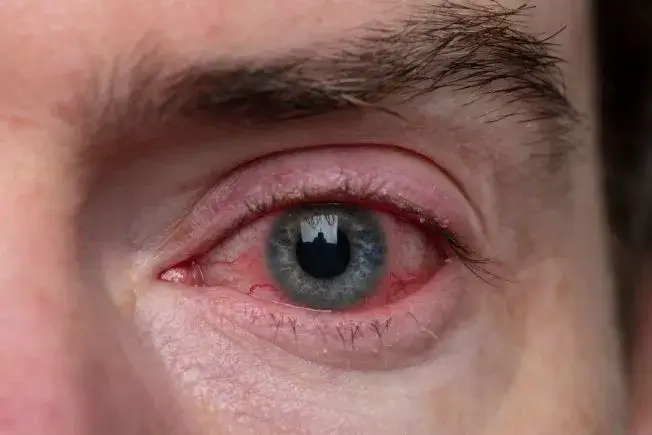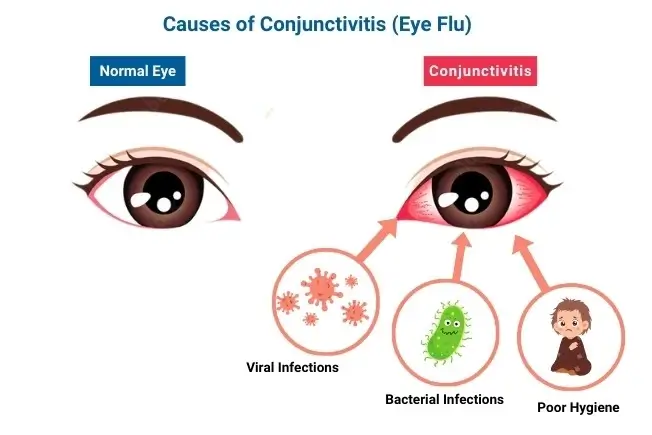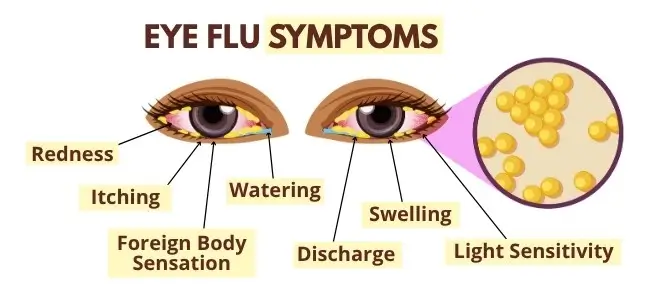Commonly known as Viral Conjunctivitis , Eye flu has become an increasingly common contagious eye condition occurring especially during warm and humid weather. with symptoms such as redness, itching, watering and discomfort , it can spread quickly and if not managed timely can affect the entire family, classrooms and offices.
Our expert eye specialists at Save Sight Center , Delhi, have treated numerous patients with eye flu. In this article you will explore and understand the causes, managing the symptoms and best ways to prevent eye flu from spreading.
Eye flu or commonly known as Viral Conjunctivitis is an inflammation of conjunctiva- the thin white membrane covering the white part of the eye and inner eyelids.when this membrane gets infected ,the blood vessels in this region dilate leading to reddish or pink appearance of the eyes.

Conjunctivitis spreads through touch,shared objects or close contact. Even simply rubbing your eyes after coming in touch with a contaminated surface can transmit the virus.Maintaining good hygiene and avoiding direct contact with infected individuals becomes a crucial preventive measure.
There are several factors that can cause eye flu , but in most cases it arises from infections or by poor hygiene. Let's take a look at the most frequent causes:

There are two major viruses linked to eye flu- Adenovirus and Enterovirus.These virus invade the conjunctiva leading to redness, swelling and irritation.
How to reduce the risk : since it is a highly contagious maintaining distance from infected individuals and avoiding crowd can reduce the risk.
The most common bacterias that cause conjunctivitis are Staphylococcus aureus, Staphylococcus pneumoniae and Haemophilus influenzae. These can trigger discharge and crusting around eyes.
Using others towels ,makeup , eye wear and items becomes a medium of transmitting infection. This also increases chances of developing conjunctivitis.
Symptoms of Eye Flu varies depending on the cause , but the common signs include :

Other symptoms:
These symptoms might be associated along conjunctivitis if your infection accompanies viral illness.
Eye flu spreads rapidly making prevention the top most priority. Protecting yourself and others becomes a crucial point. Here are a few simple basic hygienic habits that can help you go a long way.
Eye flu, in most cases, tends to resolve in about 10-15 days. However, it is important to get a proper diagnosis to differentiate from allergies and other eye conditions.

Here are the treatment approach for Eye Flu:
Applying cold compress on closed eyelids helps reduce redness, itching and swelling. Make sure to use a clean cloth each time to avoid re- infection.
Usage of lubricant eye drops as suggested by the doctor not only helps soothe dryness but also helps flush out irritants. Lubricants are also available over the counter.
Medicated or lubricating ointments are suggested by doctors to keep your eyes moist and relieve irritation especially at night.
Antibiotics or mild steroidal eye drops are suggestive in severe cases or mixed infections to control inflammation and in preventing secondary infection. These are to be used only under medical supervision.
Tip : Avoid self medication!
Usage of random drops not only worsens infection but also delays healing. In certain cases it might lead to complications or other kinds of eye problems.
Book your consultation nowwhile you consider approaching medical care , here are some quick and simple home remedies that helps you ease your symptoms and promote a faster recovery.

In certain cases, doctor may prescribe oral medications such as :
While Eye flu often resolves in a few days , you are advised to visit an eye specialist if one of these persists :
If you are unsure on how to proceed , visit us at our Save Sight Center where our experienced ophthalmologists use advanced diagnostic tools to confirm whether your symptoms are due to infection , allergy or any other underlying conditions.
An early diagnosis ensures faster recovery !
Eye flu equally affects both adults and children. Kids are especially more vulnerable as they often come in close contacts at school and at times may not follow healthy hygiene practices.
If your child has redness, soreness , watery eyes , keep them home until the symptoms subside. This helps preventing spread of infection . Teach them healthy hygiene practices such as regular hand wash and to avoid touching their face.
For adults, staying home helps preventing the transmission.
In most cases it lasts upto 10-15 days . Recovery varies on individuals immune responses and treatment.
With healthy hygiene practices such as washing hands , avoiding contact with infected people and their items , flu can be prevented.
Eye fly rarely leads to vision loss except in the case of severe and untreated infections.
No. It does not spread by sight or air . It spreads via direct contact with the infected person.
Viruses, bacteria are the main reasons of Eye Flu.
Copyright © 2025 | Save Sight Centre | All Rights Reserved.